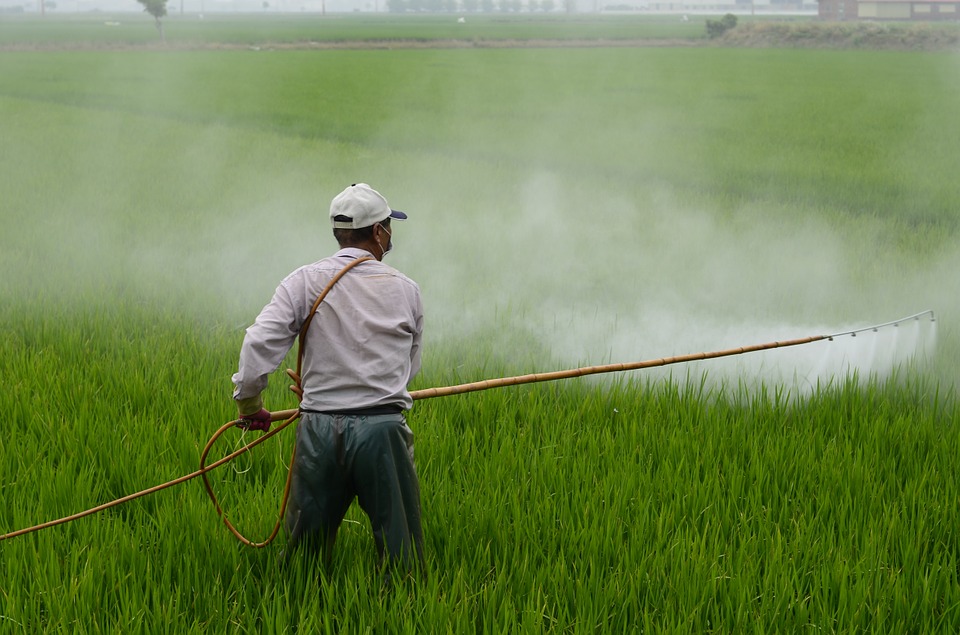Pesticides benefitted the business agriculture immensely, boosting the crop yield by massive amounts and many people at the time did not know or think about the negatives of using pesticides. They saw that the benefits of more food with little trace of pesticides was better than having significantly less food, the benefits outweighed the negatives.
 This issue of low crop yield due to pests has been an issue for human beings throughout history, with the earliest use of pesticides 4500 years ago. The original pesticides used by Sumerians were sulfur compounds to control insects and mites, whilst about 3200 years ago, the Chinese were using mercury and arsenical compounds for controlling body lice. Texts from ancient Greece and Rome show that religion, folk magic and the use of what may be chemical methods were tried for the control of plant diseases, weeds, insects and animal pests. There was no chemical industry around those times so all of these pesticides were an animal, plant, or mineral-based.
This issue of low crop yield due to pests has been an issue for human beings throughout history, with the earliest use of pesticides 4500 years ago. The original pesticides used by Sumerians were sulfur compounds to control insects and mites, whilst about 3200 years ago, the Chinese were using mercury and arsenical compounds for controlling body lice. Texts from ancient Greece and Rome show that religion, folk magic and the use of what may be chemical methods were tried for the control of plant diseases, weeds, insects and animal pests. There was no chemical industry around those times so all of these pesticides were an animal, plant, or mineral-based.However, as scientists did more testing on foods treated with pesticides they saw that the chemicals did more than giving a larger harvest, they found that the chemicals were impacting the wildlife and environment around. Bald eagle populations declined because the DDE compound, the metabolite of DDT, in pesticides thinned out eggshells. The fish in neighboring lakes and streams were affected by the OC and the animals who eat the fish are affected as well. Not only does it harm animals but the people who handle pesticides on a daily basis have been exposed to hazardous chemicals and are feeling the after-effects.

There was also the use of pesticides in the Vietnam war. In Operation Ranch Hand, the Americans sprayed nearly 19 million gallons of herbicide on approximately 3.6 million acres of Vietnamese and Laotian land to remove forest cover, destroy crops, and clear vegetation from the perimeters of US bases. Later, evidence showed evidence of cancer risk of Vietnam veterans, workers occupationally exposed to herbicides or dioxins, and of the Vietnamese population.
Pesticides are helpful economically but detrimental to the environment and affects everything in the ecosystem.
Sources:
https://www.ncbi.nlm.nih.gov/pmc/articles/PMC2984095/
https://agrochemicals.iupac.org/index.php?option=com_sobi2&sobi2Task=sobi2Details&catid=3&sobi2Id=31
https://en.wikipedia.org/wiki/Operation_Ranch_Hand
https://www.safewater.org/fact-sheets-1/2017/1/23/pesticides
I love how you include a lot of facts about pesticide use and its impact on wildlife and the farming industry. In Vietnam, the US is notorious for the use of Agent Orange, an herbicide and defoliant (kills plants and weeds). Up to 4 million people were exposed to Agent Orange and 3 million suffered from the chemicals. The Red Cross of Vietnam estimates that 1 million people have diseases and disabilities like cancer as a result to their exposure. A big purpose of this act was to destroy crops in Vietnam. While it may seem like this happened awhile back, the impacts of Agent Orange still persist. Fish in Vietnam feed in contaminated areas to this day and many children have been born with defects and diseases from Agent Orange.
ReplyDeleteSource: https://en.wikipedia.org/wiki/Agent_Orange
I really liked how you mentioned the various uses of pesticides, both on crops and in war. I also thought that your information of DDT was very informative. Many Americans did not believe that pesticides like DDT could do any harm, but environmentalist Rachel Carson did raise awareness in her book, Silent Spring. Although she wasn't widely believed until well after her death, her research on pesticides proved to be very influential. In 1962, Silent Spring exposed to hazards of DDT and questioned the US's ideas of technological process. Carson talked about how DDT entered the food chain, leading to cancer and genetic damage. This book ultimately helped to kick start the environmentalist movement, especially as more people realized the harms of pesticides to Americans.
ReplyDeleteSource
https://www.nrdc.org/stories/story-silent-spring
Despite the ban of DDT in 1972, I was curious as to if pesticides are still widely used in today's era. It turns out, DDT itself is still used around the world such as in countries in Africa as a way to kill mosquitoes. In addition, farmers have found several other substitutes to use in place of DDT. The chemical chlorpyrifos seems to be one of the most widely used pesticides in today's market. In 2001-2002, 91 percent of trace amounts of this chemical were found in American homes. Pesticides are just so profitable to the agricultural market that ruling them out entirely is impossible. As a result, the chemical, which has been linked to cause brain damage in children, will not be allowed to be sold after Feb. 6, 2020, and agricultural growers will not be allowed to possess or use it after Dec. 31, 2020. Hawaii is to ban products containing it by 2023. Starting from it popular use in the 20th century, pesticides still remain a problem today.
ReplyDeletehttps://www.npr.org/2019/10/09/768795666/california-bans-popular-pesticide-linked-to-brain-damage-in-children
https://www.epa.gov/ingredients-used-pesticide-products/chlorpyrifos
http://sitn.hms.harvard.edu/flash/2018/widely-used-pesticide-one-year-later/
I like how you mentioned how deadly pesticides are and how they really aren't all that good for humans. We still use pesticides today that aren't as poisonous but in other countries they still use deadly pesticides like DDT to get rid of pests like locusts. Overall, while pesticides are good economically they are not good for humans or other animals
ReplyDelete